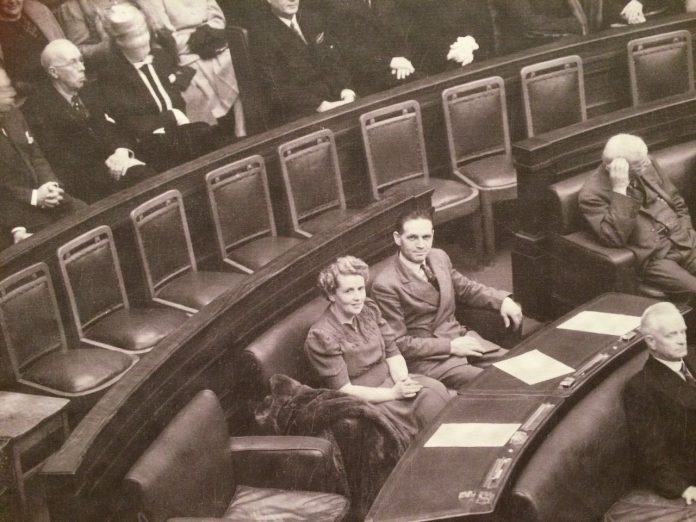Retired Perth teacher Maxine Muir, 72, is a torch-bearer for Dorothy Tangney, WA’s largely-forgotten national hero for women’s, children’s and Indigenous rights.
“Dame Dorothy Tangney was a dedicated and talented woman,” said Maxine. She should know. She is Dorothy’s niece, daughter of Dorothy’s brother, Max.
“Aunty Dot lived at the back of a Claremont house while her older sister, Phyllis, lived in the front of the house. Neither had any children.
“We kids could see Aunty Dot inside the house through the top of the back door, one of those with a barn-like split door.
“At Christmas, family came down from Geraldton and we would all get together at the house for lunch –10 or 12 of us.
“We were aware that she was doing fabulous community work but only came to realise how significant much later,” Maxine said.
At age 36, Dorothy was elected to the Senate for Western Australia in 1943. She was the first woman to speak in Federal Parliament, five days before by Enid Lyons rose in the House of Representatives.
An MP for 25 years, Dorothy would set off from Perth to Canberra on the train until ‘plane travel became mainstream.
“Her time in parliament demonstrated that she was passionate about many things,” said Maxine.
“Dorothy, in the way of her great-grandfather, political convict Owen Shanahan, meant business.”
Irishman Owen, 22, was sentenced to 14 years transportation to Australia for throwing stones at a dwelling. He also assisted in the escape from a road gang of political convict, John Boyle O’Reilly.
“At one stage Aunty Dot was serving on 23 parliamentary committees – and chairing 13 of them. In many instances she was often the first and only woman on the committee,” Maxine said.
“Her efforts during the war years were exceptional, raising nearly half a million pounds in war loan rallies (about $35m in today’s dollars). After the war, she was an official observer at the UN General Assembly in Paris.
“Experiencing poverty as a child, reforming social services and education were paramount. She knew what a difference they could make to a person’s life.
“She successfully campaigned for Canberra to accept financial responsibility for the unemployed and the infirmed. This is still the law of the land.
“For more than 25 years Dame Tangney worked for social services, widows’ pensions, child endowment, better housing, free education, Aboriginal rights and most importantly equal female pay and opportunity.”
Dorothy taught at Claremont Central School and organised hikes and weekend camps at Glen Forrest and on Rottnest.
“Expenses were kept to a minimum and no child was excluded. As many as 60 children took part and all the cooking was done by Dorothy, mainly in kerosene tins preparing curry or corned beef.
“During her election campaign in 1943, when victory seemed remote, Dorothy rashly promised her pupils a school holiday if she won.
“When her win was confirmed, journalists in Perth with the Prime Minister, descended upon the Tangney home in Claremont to be met not only by members of her family, but also by a number of her pupils making sure the promise was honoured.
“After a discussion with the Education Minister, a holiday was granted to the whole school in honour of the election of the first woman Senator,” laughed Maxine.
A 1964 newspaper article described Dot as jolly, convivial, plump and talkative.
“She prepared the way for other women to enter the Senate and to end the prejudice against women in the Federal Parliament.
“Like Edith Cowan, she led the way for women. While the electorate of Tangney is named after her and there is a plaque on St George’s Terrace, there’s little else to recognise her,” Maxine said.
While studying for her arts degree and education diploma, Dorothy, one of seven, was a trainee schoolteacher. She examined the effect of malnutrition on the health of the students at Fremantle’s Plympton State School.
Dorothy, who held many Labor Party positions outside parliament, was elected in John Curtin’s Labor landslide.
Notably she opposed the Australian Women’s Charter movement headed by prominent feminist Jessie Street, claiming it to be ‘Communist-inspired’.
She advocated for deserted Australian wives of US servicemen, Indigenous peoples, better pay and working conditions for nurses and benefits for war widows, civilian widows, unmarried women, wives of invalid pensioners, wives with unemployed or unemployable husbands, and as carers of parents.
Opposing Australian participation in Vietnam and conscription, she said she had: “two sisters who are war widows, a sister-in-law who is a war widow and a brother who is still on the 100 per cent pension.”
Prominent West Australian and future Governor-General, Paul Hasluck, described Dorothy as having a great capacity. That’s almost an understatement.
Dame Dorothy Margaret Tangney (1907–1985). Senator for Western Australia, 1943–68.



































